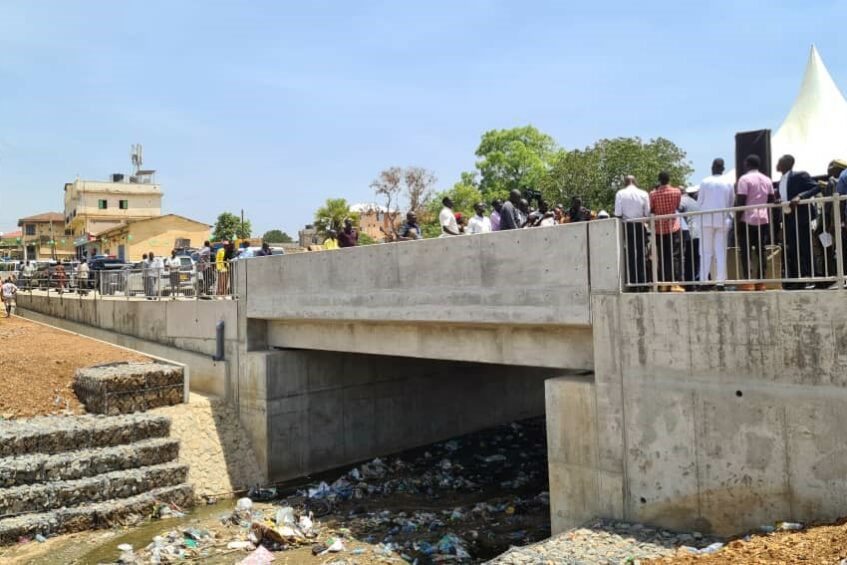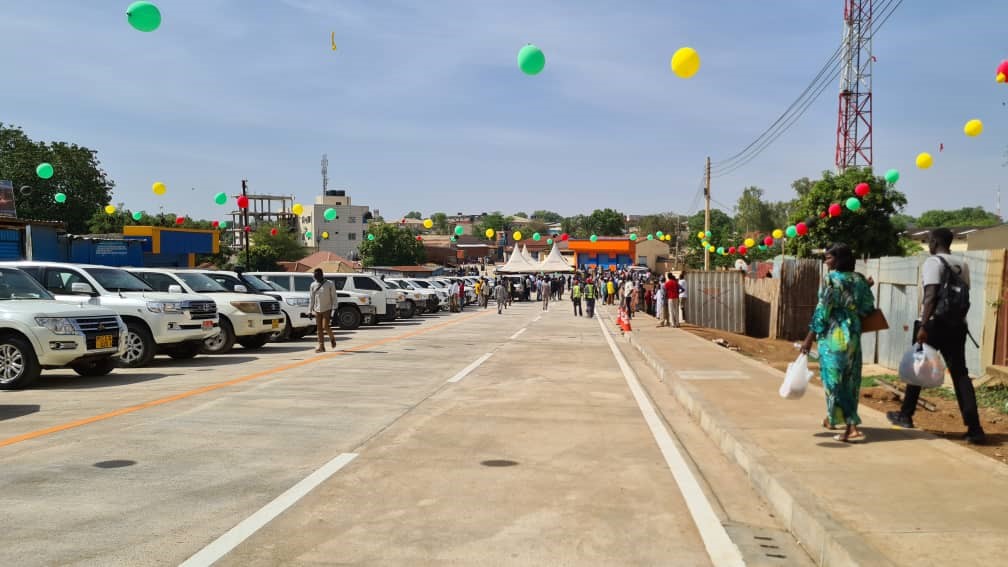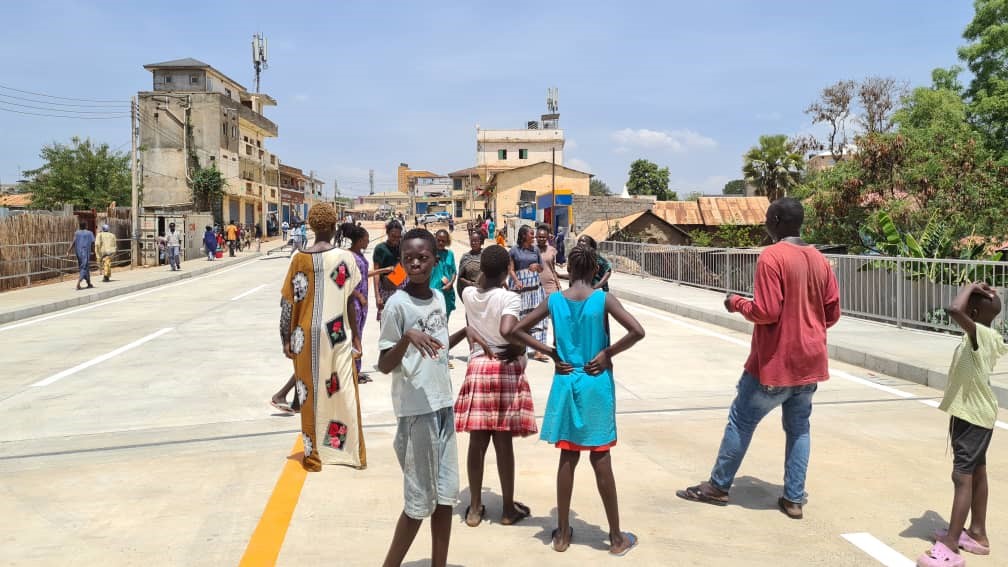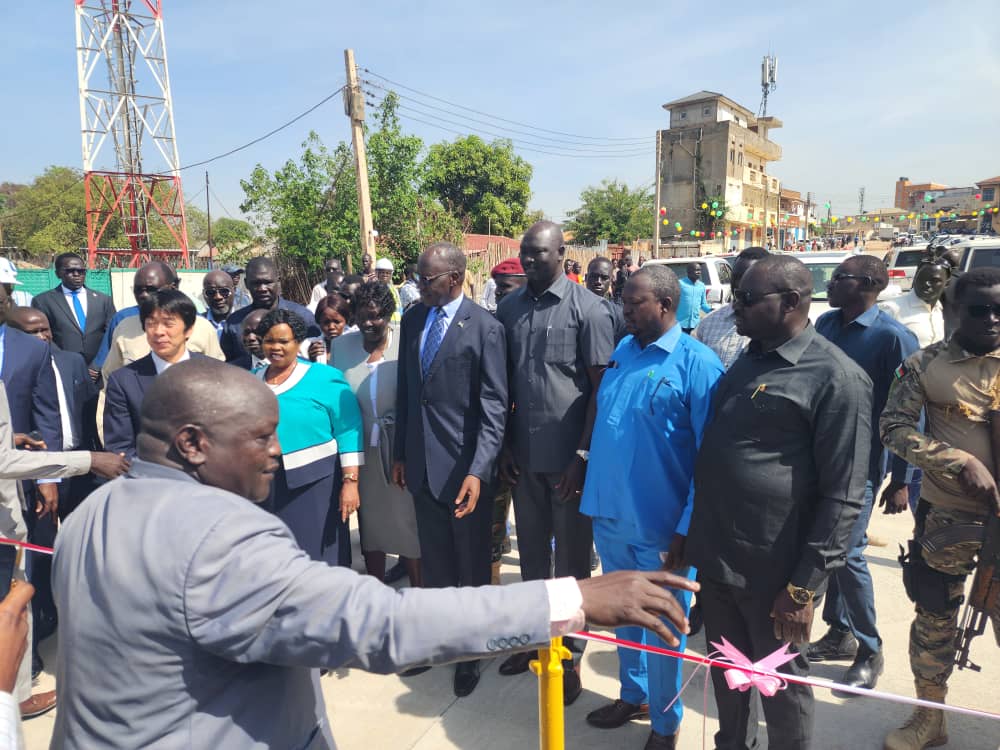
Albino Bridge in Juba during the inauguration ceremony on Friday, 23rd Feb 2024. Photo Credit: Charles Wote/Eye Radio
Albino Mangu Ganoon was not a notable political or military figure, but rather a humble businessman loved by many and envied by few.
The name Albino is the eponymous of the newly commissioned Japanese-built bridge connecting Kator and Malakia,
In 1967, Mr. Mangu built a small-sized bridge on the current seasonal Nile River tributary to connect Kator and Malakia, but it was washed away by heavy downpours over the years.
Following his initiative, the former regional government of Southern Sudan constructed a more standard replacement in 1969.
Mangu, the son of a famous electrician, hailed from Natabu in Bagari Payam of Wau County, Western Bahr el Ghazal State.
He died in 2012 at the age of 62 and was survived by 15 wives, 36 children, and 47 grandchildren.
His father was among a group of professionals who were transferred to Juba in the 1950s by the former regional government to teach at various secondary schools including Loka.

“Since Albino came to Juba, he lived in Kator here and this place was a remote area and people used to cross this bridge by foot, crossing water. When he got some money, he built a small bridge here, but it was not strong enough,” Ustaz Lino Filbert Nyar, a family member of the late Albino said.
“That bridge was not strong, and it was taken away by the flood and after that, the government intervened because this road was vital,” Lino added.
Mr. Lino described late Albino as a humble man and great storyteller who was social with every category of people he met during his lifetime.
He said the naming of the bridge after their father is a great move that preserves his legacy, adding that they are grateful to the government for maintaining his name.
“We thank the government and the stakeholders for confirming the name of the bridge to be the bridge of Albino and I also do ask them to complete the name so that let them put it as Albino Mangu Bridge.”

“The bridge is a legacy for us because all that Albino did in our country in the struggle of Southern Sudanese to obtain their dependence was not easy work,” Lino stressed.
As a young man in the 1950s, Albino became a businessman, as well as a driver owning 36 lorries, and settled in Kator.
He was one of the contractors of the former regional government of Southern Sudan for transporting students to various national secondary schools in the then provinces of Equatoria, Bahr el Ghazal, and Upper Nile.
“If you do recall, Albino was a contractor who used to transport students to the National schools, like Loka, Torit, Malakal, Rumbek, and Wau by his lorry,” he narrated.
“He takes them to the school and brings them back, and he did this for so many years after the Addis Ababa agreement and most of the officials now in the government can even appreciate him for making benefit of these services that Albino has done for our country.”
“For this bridge to be named by his name we are grateful for the stakeholders who are in charge of this to cement the name of albino on the bridge,” Lino said.
Albino’s residence is today found at the east and western sides of Albino’s bridge in Juba.
“The two houses along the road, the one on the western part and one on the eastern part of the bridge now here these are all Albino’s house and the one on that side he built it for three of his wives now the children of these wives they are staying in it.”
“The one on the western part here now we are in this one it was a project that Albino made, he wanted to make a clinic whereby people can be admitted and treated in it.”
“But this project did not succeed previously. We used to have a pharmacy on the other side now, but the project is not successful and the house is now left as a residential house for his children.”
Meanwhile, the national Minister of Roads and Bridges has directed his officials to acquire the correct names of Juba bridges for placement.
“I am directing my DG for roads and bridges as well as the director of bridges, Georgy Duku to do their assignment to get the full name of Albino, I know he was somewhere here and then Haboba bridge and all the bridges are along Luri road and inside Juba,” Minister Simon Mijok Mijak said.
He adds: “We want you to help my team with this assignment because we are going to put the names on the bridges plus the traffic signs. We are not going to change any name we are using the already names we are getting at the site. We will only give names for new infrastructure.”
Some residents of Kator in Juba have welcomed the inauguration of newly constructed Albino Bridge, which connects Kator and Malakia in the city.
The 12-meter-long Japanese-built bridge was commissioned by the government on 23rd February 2024 and opened officially for public use.
“I am really happy for this development which has happened in the state and let this spirit continue to reach to other states not only Central Equatoria alone let it reach all states like Aweil, Wau, all the states,” Snider Taban said.
Gloria Guma another resident said: “The bridge is importance because it is going to make easy for our children go to school.”
The previous Albino Bridge constructed in 1969 by the then-regional government of Southern Sudan had been on the verge of collapsing.

This prompted the Japanese government, through its International Cooperation Agency – JICA in January 2023 to embarked on the construction of the bridge over the seasonal tributary of the Nile River.
Albino Bridge is part of the 22 million US dollar project funded by Japan for the construction of three key bridges, including Giada and Kokora bridges, in the national capital.
According to Dai Nippon Construction, the JICA contractor the bridge may live for many years if well taken care of.63
Dusman Abdallah James, deputy chairperson of Kator youth group said: “We are happy for the construction of a bridge in our area now this is the development we want so we are going to inform the people around here not to dump garbage around the bridge so that the bridge does not become dirty.”
Support Eye Radio, the first independent radio broadcaster of news, information & entertainment in South Sudan.
Make a monthly or a one off contribution.
Copyright 2024. All rights reserved. Eye Radio is a product of Eye Media Limited.